A recent study provides a detailed comparison of the five-year cost of ownership between the 2024 Chevy Blazer EV 2LT AWD and its internal combustion engine (ICE) counterpart, the Chevy Blazer 2LT AWD. The study reveals a notable difference in cost effectiveness over a five-year period, favoring the traditional ICE model by a substantial margin.
The findings were published in the Vincentric 2024 US EV Cost of Ownership Analysis, indicating that the 2024 Chevy Blazer EV 2LT AWD costs $11,296 more to own over five years than the Chevy Blazer 2LT AWD.
The calculation factors in depreciation, fuel, maintenance, and other operating costs. However, it’s important to note recent adjustments to the Blazer EV’s pricing, which has seen a reduction from $53,195 to $50,195 for the 2LT AWD model. This price adjustment, not factored into the study, could influence the cost comparison to some extent.
Additionally, the comparison fails to highlight discrepancies in standard features that add value to the Blazer EV. For instance, the Blazer EV includes advanced features such as Blind Zone Steering Assist (RPO code UKI), Rear Park Assist (UD7), and an infotainment system with a 17.7-inch touchscreen, as compared to the 10.2-inch screen in the ICE Blazer. Although the ICE Blazer lacks Google built-in functionality, it does include Apple CarPlay and Android Auto.
Performance-wise, the Ultium-powered 2024 Chevy Blazer EV 2LT AWD offers more horsepower (288 versus 228) and more torque (333 pound-feet versus 258 pound-feet) than the ICE Blazer, although it also carries additional weight (about 1,200 pounds more). These factors contribute to a different driving experience that may justify the higher initial cost for some buyers.
The study also reflects broader trends observed across the EV market, with many electric vehicles facing higher initial purchase prices but benefiting from lower fuel and maintenance costs over time. Despite the higher five-year ownership cost, the environmental benefits and lower operating costs of the Blazer EV may present a compelling case for those buyers who prioritize sustainability and lower day-to-day expenses.
As a reminder, the Chevy Blazer EV rides on the GM BEV3 platform and is produced at the GM Ramos Arizpe plant in Mexico.
Subscribe to GM Authority for more Chevy Blazer EV news, Chevy Blazer news, Chevy news, GM electric vehicle news, and around-the-clock GM news coverage.

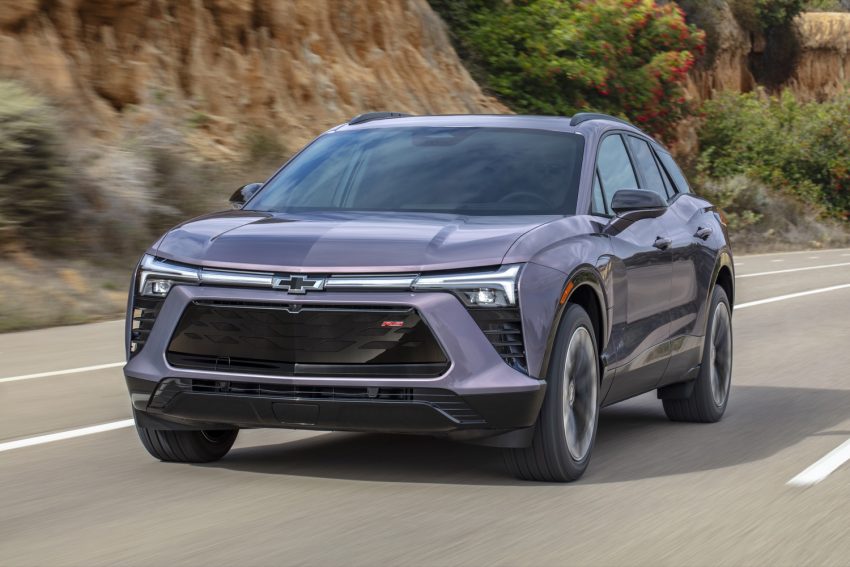
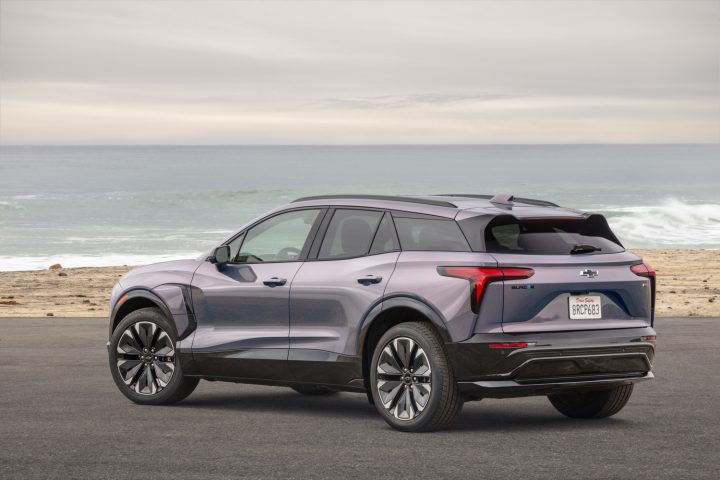
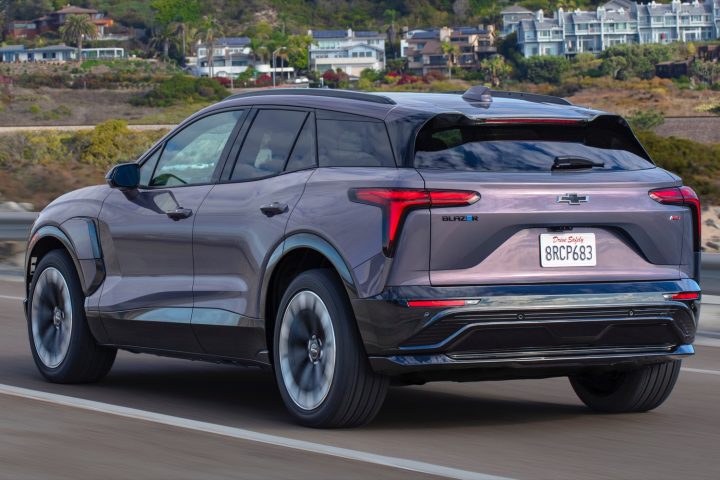

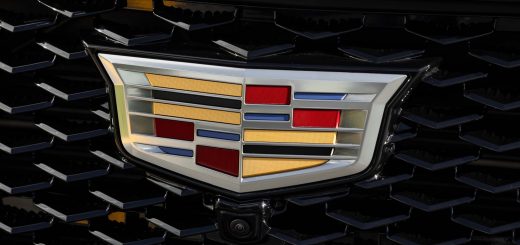
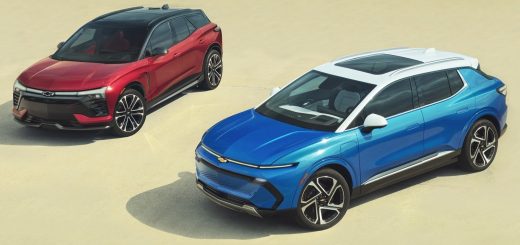
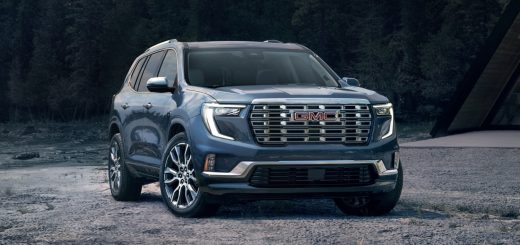
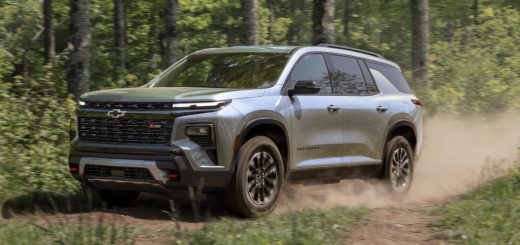







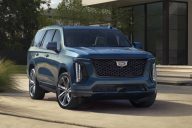
Comments
Weird. It’s almost like many of the promises made to try to convert everyone to EVs is just BS.
I have refused to convert to that religion. I am looking for older well-used cars with fewer electronics. So far, I have bought one.
They were supposed to require les money to maintain…
it was only a dream 🙁
Earth to Mathieu: The Blazer EV went on sale at mid-2023, which means that it is approaching its first anniversary in the showroom. An assessment of the car’s 5-year ownership costs after less than one year in the hands of owners is a projection. It may be a good estimate, but it is still only a projection. As such it is improper to refer to the projection in the past tense. If you want to refer to it in the past tense, then come back in 2028 after the five years have passed.
MisterMe: What Mathieu also fails to clarify is that the article is about cost of ownership. Not just the amount to maintain it. Big difference. As you stated, most all of this is projected and not actual. But overall, the main reason for the huge difference in that 5 year cost of ownership is due to the higher MSRP.
But then again, even that’s not really a true comparison as the only real thing that’s the same between the two is the name: Blazer.
The cost to insure was not discussed as well. Aren’t BEV comprehensive and collision premiums higher in cost?
Not to mention, after 5 years, the clock is really ticking on the enormous expense to replace the battery. Or if you decide to trade the EV in or sell it, the value has absolutely tanked bc the dealer/buyer knows the battery is on borrowed time.
These concerns are largely borne of FUD. Blazer EVs are Ultium-based. Ultium batteries are not monolithic, but are packs of interchangeable battery pouches. Unless you money to burn, then you do not replace the entire pack. Rather, you replace only those individual pouches that go bad.
Even in the case off monolithic batteries from other manufacturers, concerns about battery life vary to being overblown at best and dishonest at worst. Studies of EV batteries in vehicles that have been on the road for a decade or more show that these batteries decline to about 90% of their initial capacity after 10 years for [non-Ultium] GM batteries. At the 5-year mark which you set as the time when owners should begin chewing their nails in anticipation of battery failure, EV batteries retain 90% of their initial capacity across the industry which is heavily dominated by Tesla. By comparison, GM batteries retain about 95% of their initial capacities.
Even after 20 years, most batteries retain more than 80% of their initial capacity. That said, all of this does not take into account that EV batteries have lives after they are no longer suitable for propelling vehicles. Companies have already been established to recycle and repurpose these batteries for energy storage and other applications. I don’t know how much they pay for your veteran batteries, but you will not have to store them in your garage.
You must not know how much it cost to replace the engine or transmission is. Average price for a L84 5.3 or L87 6.2 v8 is about 7-8k for just the engine. Not to mention all the extra parts you will need to go along with the repair and 12+ hours to put it in. Labor alone is over 2k. I work on both ev’s and gas. Battery swaps are quick and simple.
I have to say that is such a useless point. If maintained properly an ICE engine never has to be replaced whereas your lucky if you get 10 years out of an EV. On top of that this generation of EV’s with their far less efficient, heavy batteries will plummet in value as soon as solid state batteries are in production which Toyota is about to release.
Ice engines break all the time weather it is gm toyota or any manufacture. Simply because you change the oil and filters does not mean your engine will not mechanically break down. I have seen so much camshaft, lifters, timing chains, and bearing failers just to say the least and this is not gm im talking about. Components are not meant to last forever. My friend has an 2011 chevy volt and just recently the battery needed replaceing after 13 years of use and also 153k miles on the odometer. For old battery technology I think that’s great and I can only imagine newer battery tech. Besides the battery, he has not had any issues with the electric motors. Mainly coolant and oil leaks from the engine and that’s it.
Yeah let’s base this entire conversation on your friends Volt, smh. What an insignificant point and if we’re going to go that route I had a V6 Firebird that was 21 years old with 195k miles on it that only needed normal maintenance and is still going strong with its new owner. Try to be relevant.
Kind of agree with marcus on this one. You have to compare apples to apples. Can’t compare older engines like that to what they are making now. I had an old 3800 in by buick regal and never had any issues like you besides all the leaks. I could say the same with the 5.7. All these new engines have nothing but issues.
Also, “fuel” savings for EVs mainly applies to drivers with access to off-street parking. Public charging can be more expensive than ICEs.
Ive been relying on public chargers to fuel my 2021 Bolt EV been leasing for past 3 years and charging it has never come close to what I paid for gas driving ICEs all those years. I live in Boston, MA, with no driveway access at my building, and I primarily charge at DCFC stations (the most expensive public charging option). Same location and driving habits, similar vehicle class, with ICE the cost of gas was way higher vs public chargers. With ICEs I’d spend at least $10-15 more each time at the pump and I had to refuel more often. Could be different other places. Also, no oil changes! No wasting gas idling in city traffic.
Did the cost difference exceed the difference in purchase price between the Bolt and my old ICEs, maybe not. As the article states, the initial costs are included in their calculations for first five years ownership. If they would redo their analysis just looking at years 2-5, Id bet good money youd see the EV version way cheaper to own. To everyone concerned about EV battery, warranty is 8 years / 100k transferable. Also, see consumer reports research on cost of ownership EVs vs ICE, much bigger data set and longer time period studied, they find that all EVs last on average 200,000mi (not just the luxury makers, all EVs last that long on average, even Chevys) and the battery lasts the life of the vehicle in majority of cases. By the time it goes, people tend to be ready to retire the car anyway and get a new one (which will be much more affordable by then as prices continue to drop for new EVs, and not just from tax credits!)
But what kind of ICE vehicle are you comparing gas wise to your BOLT.
BOLT is one of the smallest EV’s around… was your ICE same size???
Gm and ford do not want to sell electric cars its that simple the rest of the world auto manufacturers will be leading here in the USA FOR PRODUCTION OF EVS SHORTLY
LMFAO……..what will the EV fanatics say now???
I’ll take my ICE vehicle all day
There was an identical analysis conducted by the same party that found that the LYRIQ with a much higher MSRP than the XT5 still had a comparable cost of ownership.
What? No it did not. The Lyriq was still more expensive to own. And to top it off, a base Lyriq with nothing on it costs as much as a premium luxury XT5. My XT5 is pretty loaded (with exception to the platinum package and V6 option) and at $58k it only reaches the level of the base Lyriq in price. Cry harder fanboy. These cars have ZERO value to them.
No it is not, you are looking at cost up front. You forgot that GM is also giving 7,500 off msrp so starting price is really like 50k. Also if you are a dealer or gm employee, you also qualify for an additional 2,500 off. I’m not sure if this applies to students, teachers, military and first responders though. You are getting around the same range as an xt5 which is around 300 miles. Also when you average the cost to fill up an xt5 which is around 60 every week and a half to 2 weeks on average it really adds up. Not to mention your $100 oil changes every 4k miles. Costs almost nothing to charge up a lyriq especially if you own a home. Gm even pays to get your house ready for a charging station install. In regards to insurance, I have tried comparing prices between ice and ev and there is not really much of a difference. I guess it really depends on the actual price value of the car.
Yep, saw that. If you are going to compare a BASE LYRIQ– then you must compare it to a base XT5(THE LUXURY) Unless they’ve changed, XT5 comes in LUXURY, PREMIUM LUXURY, & SPORT!!! Ya don’t compare a Base Lyriq to a Premium XT5—-■■■
Sure they did… they compared a Luxury Lyriq to a PREMIUM LUXURY XT5….
APPLES TO ORANGES… PREMIUM LUXURY COST MORE!!!!
HOw about compare a LUXURY Lyriq to a LUXURY XT5…
OR a PREMIUM LUXURY LYRIQ to a PREMIUM LUXURY XT5…
APPLES TO APPLES!!!!
It’s impossible for these studies to be accurate. For example, my employer offers free charging. Secondly, the electric rates in my area are among the lowest in the US. There’s no regulation of gasoline prices, so the sky is the limit. Public utilities in my state are governed by the state public service commission. A hearing is required to raise rates. I will add that if my employer offered free gasoline I would not have opted for an EV.
So basically this is all because the upfront costs (MSRP) is a descent amount more. The actual cost of ownership that most accustom to (maintenance, insurance, repairs, etc) are lower with the EV (though insurance I am hearing might not be). So this is skewed. I am not the biggest fan of EV’s, though they certainly have their place, but lets compare apples to apples here.
A Blazer AWD RS ICE is $47,095, a Blazer EV RS is $47,095, this is on Chevy’s website right now under the build it now. An EV is less maintenance, so only the other costs come in to play here (repairs, insurance and anything else not attached to purchase price). Yeah, I don’t buy this assessment one bit. Maybe depreciation as EV’s aren’t selling as well is a bulk of it? I dunno, but the general costs to own are less. Police departments that have done both have shown significant savings in fuel and maintenance costs as charging generally less expensive than gas by a fair margin.
Because my state’s budget is upside down because of a shortfall in tax revenues, my opinion is that some sort of road use tax will be enacted in the coming years on EV’s. My last electric bill from National Grid equals 34 cents / KWh.
Twenty states have an EV fee. NJ just passed $250/yr with first 4 years paid in advance, goes into effect July 1. As of 9/2023 34 states have an EV tax.
. 34/what is expensive! Ours varies from 8 cents to 13 cents….
I’m in norther Florida.
Of course we have the rip-off>> “ready to serve” charge of about $23.00 each month. So maybe that equals out to your 34 cents! Could be???
I just don’t get it with these studies… If the cost of the car is almost NOW $4,000 less, AND gets a $7,500 point-of-sale fed rebate, AND in many states like NY State gets another $500 Point-of-sale rebate from the state, that is immediately $12,000 cheaper than in the study. They release the results – but can’t readjust the published MSRP from weeks ago? That is worse than a ‘slow moving’ bureaucracy.
Gary: You must live in New England. My National Grid bill is $0.16 per kilowatt-hour. Plus if you like, you can decrease that to around 8-10 cents with time-of-day metering. Its harmless to check out also since they will calculate the bill both ways for 12 months. If the 24/7/365 old way turns out to be cheaper (due to higher on-peak pricing under time-of-day), they’ll refund the difference.
My Concern about the Blazer is the labor rate paid where it is made. If you pay workers only $2 an hour, you get a vehicle’s assembled quality that seems like the workers were paid $2 per hour. Look at all the abortions FORD is turning out there.
The results of studies like this will vary depending on a whole bunch of factors, like everyone has commented on. There are unique scenarios that may make the EV less costly to own over 5 years than the ICE equivalent (local fuel prices, local electricity rates, availability of free charging, etc.).
The article comments about taking into account feature discrepancies…it’s not studying owner satisfaction, it’s studying ownership cost, so that point in irrelevant. Though, as many have pointed out, the cost difference might simply come down to the difference in purchase price (which will be affected by the specific features).
What will be really interesting is the longer-term studies that take into account the maintenance and repairs in the 5- to 15-year ownership. Let’s face it, with the prices of vehicles these days, very few people are trading up every 5 years. The ownership cycle will be 5-15 years. Long term ownership costs are going to be much more relevant to most consumers trying to decide on their next vehicle.
Bill: Yes I live in New England. National Grid Is waiting for approval to increase rates from the state regulators. These rates will increase yearly to cover grid upgrades, because of increased demand due to mandates including building codes and EV’s. Several towns here have already banned fossil fuels in new building construction.
Pardon the pun, but it’s an apples to oranges comparison. IMHO, you can’t make a fair comparison bc there are too many unknown cost variables as all of you have mentioned. Having owned a BEV and a PHEV and now back to an ICE vehicle I would suggest one has to decide if they going “green” at almost all costs or you know the charging infrastructure is not adequate at this time, as I decided. If your motive is saving money you likely do not have much reliable information to make this decision.
This is why, on this site, it makes me wonder. Do you people, or GM, think for real long second that ICE cars are going to be sold in 2035? I don’t have a EV, a HEV, and I love it the second one I have owned. Kia. I get over 50 mpg, can toast most anything around town, 0 to 35 is amazing, after that kinda falls on it face, but still. I fill up with 10 gallons, the tank is only 10.5 gallons, and can go 550 miles. 2024 Kia Niro. Super nice, lots of space. And more safety stuff than you could shake a stick at. The car will stop itself if it sees that you are about to hit a bike or another car, or a person. Drives itself on the highway, just good stuff. 34k out the door. Humm. GM needs to get busy or they are going to go the way of Sears and GE. And no one thought those two would ever go away.
Great point, but, yes there will be a growing market for BEV’s. Will it be 50% of all cars sold by 2035? Absolutely not. It’s about 8% now and my guess is it may go up to 20% by 2035 assuming the product offering and charging infrastructure improves. If you want to save money and reduce your carbon footprint, then go to a mid size hybrid that gets 40-50 mpg for $35k-$45k.
Off the subject, just a bit, BUT, Actually– I think it’s a scam that taxpayers are forced to help people purchase an electric vehicle!!
Purchase your own vehicle, whether it’s ICE or EV, PHEV… Nobody should be forced to help you purchase a car!
Don’t see what the back and fourth arguing is all about. As an old man I have to say I do love my gas engines especially my turbo 3.8 grand national. I recently took the plunge and purchased a lyriq from a buick enclave. I would honestly have to say I have absolutly zero regrets. Barely have to do maintenance and the few issues I had the dealer was able to resolve with software updates. Also charging at home is really convient and I have saved tons on gas. Do I miss gas engines, yes somewhat but honestly I’m happy with electric. Only thing I wish the lriq has is the engine noise like the hummer but I guess thay would not make sense on this car.
And here I thought GM Authority was simply reporting as an impartial “authority “ on GM news. But seems this reporter try’s to make the MSM case for EV
“Blazer EV may present a compelling case for those buyers who prioritize sustainability and lower day-to-day expenses.”
Really!?